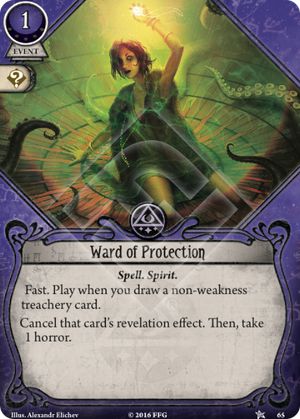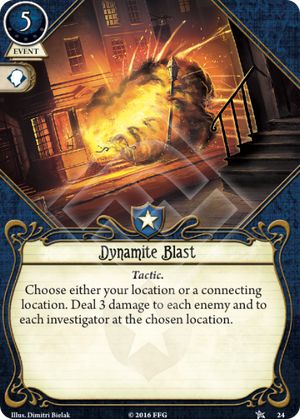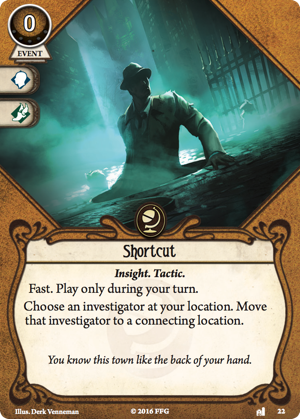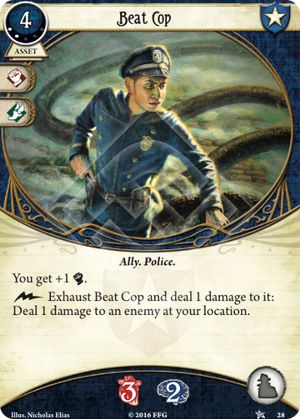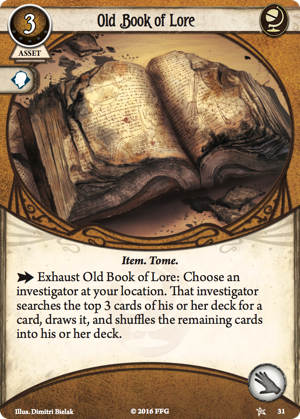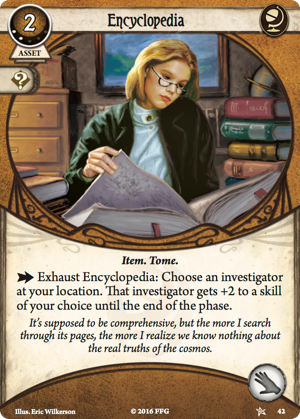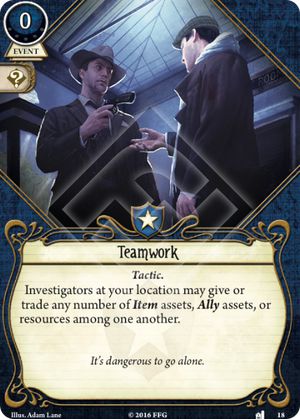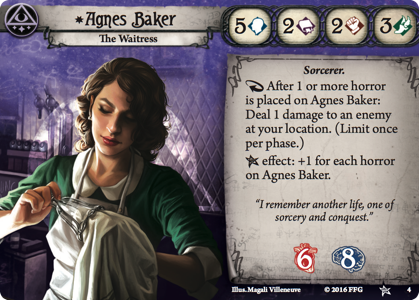 |
| A waitress by day, a powerful sorceress by night. |
While Agnes seems to be just a shy waitress,
there is more to her than meets the eye. She used to command forces of
seemingly unlimited power bringing doom to her foes. Even though she's scared
of these memories and the power they bring, she will not hesitate to use it
against the evil forces, threatening to destroy mankind.
Legacy: Agnes has always been designed as one of the most proficient spellcasters (if not the strongest one indeed). Her stats were maxed for handling the arcane, her abilities were either strengthening her spells (Arkham Horror), enabling her to gain more of them (Eldritch Horror) or making it easier for her to successfully cast them (both). She was considered one of our favourite characters1.
Her vision is no different in AH:TCG – her stats make her a perfect spell-casting monster-wracking machine. Both her class and her signature card encourage building her deck around spells, too.
Legacy: Agnes has always been designed as one of the most proficient spellcasters (if not the strongest one indeed). Her stats were maxed for handling the arcane, her abilities were either strengthening her spells (Arkham Horror), enabling her to gain more of them (Eldritch Horror) or making it easier for her to successfully cast them (both). She was considered one of our favourite characters1.
Her vision is no different in AH:TCG – her stats make her a perfect spell-casting monster-wracking machine. Both her class and her signature card encourage building her deck around spells, too.
Skill Values:
As I've already mentioned, Agnes is born to
wield the art. Will of 5 precisely defines her area of interest. Each time
she is to use a spell you can be sure it'll be cast at a proficient level. Both
her Combat and Intellect are negatively affected by this specialization - with a
value of 2 (lowest Intellect so far, along with Zoey) she needs to rely on
magic for both fighting and discovering clues.
Agility of 3 helps Agnes in two ways. It
allows her to evade enemies, while she's gathering and playing her magical
assets. Secondly, together with her superior Will, it provides her with a great
protection against the Encounter Deck. This is exactly what a witch needs.
Such specialization allows her to handle all kinds of situations perfectly with an appropriate spell If she fails to draw the correct one, however, Agnes can easily find herself in troubles. This is exactly what a pure spellcasting investigator should look like, though.
Such specialization allows her to handle all kinds of situations perfectly with an appropriate spell If she fails to draw the correct one, however, Agnes can easily find herself in troubles. This is exactly what a pure spellcasting investigator should look like, though.
Strength
Theme
Special abilities:
Agnes’ ability enables to put her sanity
loss to a good use, dealing damages to enemies. First of all, it allows her to
get a benefit from purely negative costs – sanity lost on casting spells, using Forbidden Knowledge etc. Secondly, it allows her to strike back, when
attacked in the enemy phase (her ability works once each phase!). Last, but not
least, when she’s left with no means of fighting, she can at least do some
damage with her ability.
Unlike Roland’s or Wendy’s ability, Agnes’
power needs careful planning, particularly during the deck creating. It is
worth to create as many opportunities to use it as possible, even more so if
you can decide yourself when the sanity loss occurs (like in the case of
aforementioned Forbidden Knowledge). Consider using some sanity recovering
cards (Fearless, Clarity of Mind).
You must also carefully plan using the
ability, while playing. Remember about the limitation and do not decide to lose
sanity, before it’s necessary. First check if spell caused you to take horror, before
you do action, which outcome is surer.
All in all, her skill might come extremely
handy in sniping one-health enemies, or wearing down bosses. Enemies are bread
and butter of AH:TCG, hence it is used quite regularly. Still it comes with constraints,
as Agnes Sanity is not limitless and sometimes she is forced to take horror
without benefiting out of it.
Also, one easily missed rule – horror must
be placed on Agnes, not one of her assets to trigger the ability. Therefore I
almost always put all the remaining horror on assets (unless it’d destroy
them).
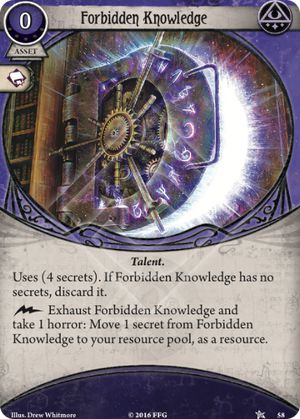 |
| Absolute must-have in every Agnes' deck. provides means of playing her expensive assets. And deals damage whenever you need it. |
I still remember reading Agnes’ ability for
the first time and struggling to understand, what it is supposed to
thematically represent. Unlike most of the abilities it does not have a very
clear connection between the gameplay result and the thematic event it is
supposed to symbolize.
A picture started to slowly appear in my
mind, when I was reading descriptions of the spell cards. Just like in previous
Arkham Files games, Agnes casts spells with an added efficiency, dealing extra
damage. Even more of an individualized meaning emerges upon reading her story.
I imagine taking horror uncovers previously locked (suppressed) parts of her
memory, containing unnatural arcane knowledge. Using the freshly regained
wisdom, Agnes slays every evil being opposing her. One must really appreciate
this sophisticated yet precise design.
Agnes’ Elder Sign effect is rather a boring
one. It pretty much follows Roland’s design – unnecessarily high positive
modifier. It’s consistent with the “theme” of horror and the idea of Agnes
growing stronger through unlocking her memories.
Strength
Theme
Signature cards:
Agnes’ signature card seems not to get too
much love around. I could easily understand that sentiment earlier on – it
wasn't particularly strong with only base set cards around. There were too few
spells available to regularly benefit from her necklace. Dunwich Legacy,
however, brought 2 more level 0 spells and additional one with level of 2. Now
you can easily have 8-10 Spell cards in your deck, which might result in
drawing quite a number of additional cards.
It still has some drawbacks, though. Necklace
is far less useful if drawn later on, almost making it an auto-commit (and its
icons are not too impressive). It is also rather a costly asset. Moreover,
Agnes has access to two other assets for the Necklace slot – Rabbit's Foot
and Holy Rosary. Particularly the latter is tough to pass on, as it boosts her
Will. Ironically, using her precious Hyperborea witch necklace makes her less
potent at spellcasting.
While it's a great reference to Agnes’ story
about the recently discovered Hyperborean artefact, her signature card is not
an overwhelmingly thematic card due to its questionable interaction with Holy
Rosary.
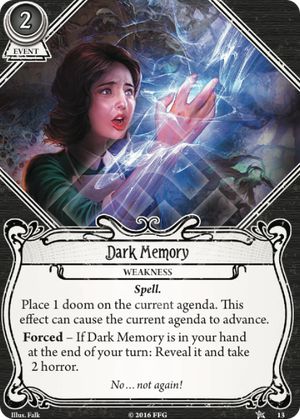 |
| You should have listed to your mom when she said: "Don't play with magic!" |
I very much like the design of Agnes' weakness.
It's a spell, very clearly on the dark magic side of the sorcery. Even though
it is a weakness, it might be used to your advantage. If you decide to postpone
playing it, you might make use of Agnes' ability. It comes at a hefty cost of two
sanity (so basically double the cost), yet when back against the wall, you
might consider it a good trade. When you decide to play it, you might just take
advantage of Heirloom of Hyperborea to replace the drawn weakness with a
"real" player card. Still these options are just a minor consolation
price, when you realize you just payed two resources and an action to add a
doom token. And you can't play it cleverly, timing it in a way that would not
hasten agenda's progress, as the card clearly states it can cause agenda to
advance.
The thematic implications of the gameplay
options mentioned above create a great thematic experience. Even just the
straightforward results are quite thematic. They remind you, that you can't use
magic without paying its cost. In the end it always works for the benefit of
the evil forces, advancing their agenda.
Strength
Theme
Class/Deckbuilding
options:
Choice of Agnes’ class is rather obvious, considering her spellcasting
theme. The addition of a Survivor subclass creates a very interesting mix. It
does not only match very well thematically (Agnes is just a simple Waitress,
who just become aware of her previous life). It also provides her with great
deal of useful cards.
Main problem with playing Agnes is – you usually cannot do well in a
given area without an appropriate spell. Without Shrivelling or Blinding Light
you struggle with enemies. Without Rite of Seeking you have hard time
investigating etc. Here red cards come as a perfect help. Survivor weapons are
suboptimal as a first choice, but perfect if you add them to increase a chance of
drawing anything to handle enemies, while biding your time and waiting for
stronger options. Both Baseball Bat and Fire Axe have their downsides, yet are
able to provide decent enough bonuses to Combat to offer Agnes fair shot at
fighting. Look what I found cannot be the long term source of clues, but makes
it possible to do some investigation, while waiting for purple cards to come to
your hand.
Some other survivor cards match her needs as well – Lucky! is one of the
strongest events in the game, so no surprise there (and the upgraded version
helps going through the deck), but you might also consider a Leather Coat to
help with her slightly lower Stamina or 2XP version of Peter Sylvestre to help with
spellcasting, some evasion cards allow to allow her for sneaking around if you
choose to… list of matching cards is truly astonishing.
Strength
Theme
Agnes is a perfect thematic representation of a magic user, who is almost
powerless without the arcane forces. First Mystic character sets high standards
for the next ones and proves fun and efficient, even more so with the freshly
expanded card selection.
I am waiting to see bit more punch for the fight capabilities of
spellcasters. Once it’s there, I am sure Agnes will excel at it, just as she excels
at all other areas of magic. You can shape her according to your preferences –
while making her the main fighter is pending arrival of another
monster-wracking spell, she can easily handle investigation (with a combination
or Rite of Seeking, "Look what I found!" and my absolutely favorite Drawn to theFlame), be an all-round or a support investigator.
Strength
Theme
1For both
Arkham Horror and the Eldritch Horror we come up with a drafting idea to ensure
– good balanced team and sharing the characters quite evenly, when it comes to
the fun factor (we usually play 3 each). We first draw 3X investigators, where
x is number of investigators each of us controls. Than we choose a team, making
sure we have appropriate number of fighters, gate closers, support etc. Once
they are selected, one person chooses one investigator to play, the other
chooses 2, again first person chooses 2 and the third gets assigned
automatically.
2It is
sometimes overlooked, that drawing a weakness not only forces you to deal with
it, but also robs you of a player card.
All images are courtesy of cardgamedb.com and fantasyflightgames.com








